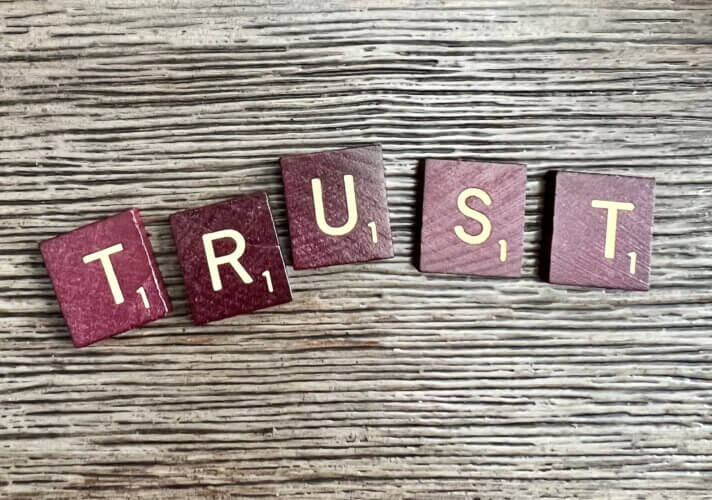My former program director at Community Change Inc. (CCI) used to always say that “we build at the speed of trust.” It is a phrase that has stuck with me over the years and one that I have since brought into my own professional and personal life.
In many ways, it’s more than a phrase. It is an absolute truism in movement building and, frankly, in life. In anti-racism work, it is also the missing ingredient in most work and, given the moment, it is easy to see what happens when there is little to no trust.
Unlike many other types of work, anti-racism work is not simply a check-the-box situation. The push to make it so is a failure of the current iteration of this work and why many are moving away from it. There is no trust. This is clear in recent years and months as we see certain highly regarded figures and organizations fall from the perches we put them on—and they fell largely because of lack of trust-building. It’s easier to “trust” in the safety of the cocoon of whiteness than to venture out into the unknown and forge more lasting and difficult kinds of true trust.
The foundation of anti-racism work is based on recognition of human suffering and the belief that we can move beyond that foundational suffering and inequity and make things right through awareness, education, activities, and the occasional change in laws.
Our funders and donors expect us to explain how we will use their funds and right the wrongs on racism, and if we “fail” or don’t do it in a “timely” fashion, these funders feel more than justified in not continuing the funding relationship. Anyone who has ever applied for grant funding for anti-racism work knows this.
While I appreciate wanting to get the most from your money, changing institutions and society at a root level isn’t cut and dried, and it surely isn’t swift. More importantly from my perspective and that of so many others who do this work: How are we building towards an equitable future under the constant threat of losing the resources to fund the work?
How do we reconcile this, especially when the people controlling the resources are white? While these white people are not the same white people who necessarily created the issues we are addressing, the fact remains that these white people benefit the most from the current system of inequity, even in anti-racism spaces.
The inherent lack of trust that overshadows anti-racism work and much of our larger culture is a core tenet of white supremacy culture. It is so ingrained that it’s assumed to be normal. We live in a culture that doesn’t trust that people who live oppression daily know better about it than the outside experts or the folks often in charge who have the money. We constantly look for external guidance and validation in almost every area of our lives, because our innate ability to trust ourselves has been stripped from us. It’s what keeps the self-help industry and consultants in business. Social media is chock full of people who are happy to build platforms based on our need for external validation and expertise. People who we assume are better, so we trust them—sometimes over ourselves. If you think I am kidding, fall down the relationship advice-giving sections of Instagram and TikTok.
In anti-racism work, though, long-term progress requires trust and taking the time to build that trust. It demands it.
As does all movement work, across all relationships. It is the trust-building that plugs us into our own humanity and the humanity of our people and comrades in this work. That trust-building will never come from a book; it will only come in community with people. People who are willing to be raw, raggedy, and vulnerable at times. People who celebrate the wins and the losses and live and lead with humility and intention.
I have been learning this lesson over the past decade and, in the most unexpected way, that came full circle a few days ago. You see, when I was hired as executive director of CCI in fall of 2013, I beat out a lot of people to get the position. I was told that over 40 people applied for the position, many with deep connections to the Boston anti-racism community. A city that I did not live in, nor did I have any connection to. I would later learn that when I was hired for the position, the other final candidate for the position was a white woman who had not only been a member of Boston’s anti-racism community, but had been a member of the CCI community for decades. She was personal friends with the director, who was retiring, and was a mentee of the founder.
Initially, this was seen as a testament to my skills, education, and experience. But over time, I have come to see it as a failure of the board that hired me to understand how important relationships are to our work. Yes, the board wanted a business-savvy anti-racist at the helm, but to hire a Black woman with no ties to a city to lead a 45-year-old anti-racism organization with a focus on the white problem—thus needing to work with white people in the community—is also a potential recipe for disaster.
Early on in my tenure, I was given a list of our key external organizational stakeholders to meet with. Guess who was on that list? The same woman whom I beat out for the position. It took me several months to get my nerve up to contact her, and when I initially did reach out—well, she was none too happy to hear from me and she told me so. No beating around the bush. She told me straight-up that she wasn’t ready to meet me. As a result, it would take over a year before we would meet and to say our initial meetings were tense would be an understatement. It also would have been easy for me to think she was just another shitty-ass white woman, if I had no understanding of how important it is to be real in this work.
Over the years, we have developed a relationship and we have partnered on projects and I have come to respect her honesty, no matter how jarring it was and sometimes still can be. The truth is that I very much respect her as a person and comrade in this work. A few days ago, she reached out with a request and we ended up shooting the breeze and we discussed how important building trust is in the work. In fact, if all goes well, in a few weeks, I look forward to breaking bread and having a drink with her. It has been too long.
I often think of this relationship as an example of the type of trust-building that requires our real, raw, raggedy, and vulnerable selves. Racism is personal and we are all impacted—our individual work varies based on our racial identity. For white people, it means allowing themselves to be real, not the “real” superficiality that the culture of whiteness expects of its participants. But the realness where one can trust they can speak their truth. Even uncomfortable truths across racial lines, which could easily be misconstrued and become a racial fire.
Too many times, I see and work with white people who are not able to tap into their realness and who cling to the efficient work models of whiteness—and to their roles or positions. These are barriers to the work and they don’t allow for the trust to be built that keeps us in this work. I am not sure where the anti-racism movement is headed given the current culling and cutting back, but if it moves us to authentic truth and trust and away from simplistic how-to work with “experts” who don’t really understand, I think the pain of this moment will be worth it. Without trust, and a merging of the head and heart, we will never move beyond incremental change.
If this piece or this blog resonates with you, please consider a one-time “tip” or become a monthly “patron”…this space runs on love and reader support. Or consider bringing me to your organization or group.
Image by Ronda Dorsey via Unsplash


